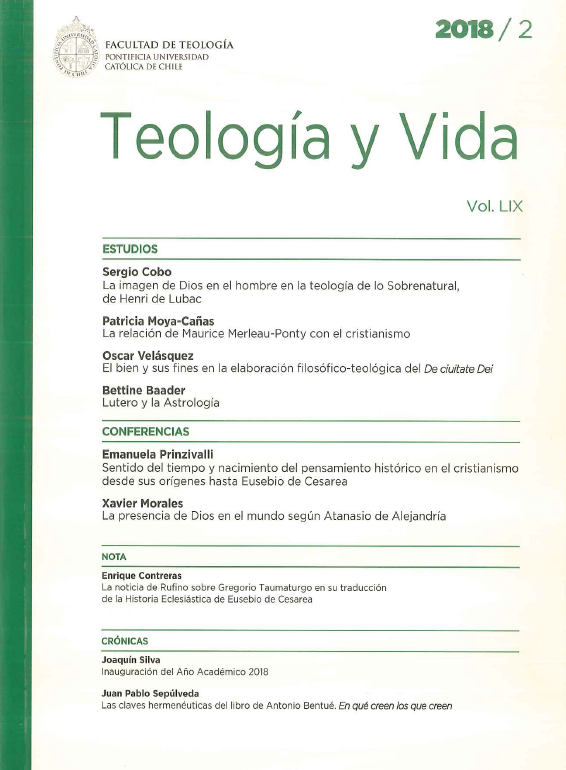El bien y sus fines en la elaboración filosófico-teológica del De ciuitate Dei
Contenido principal del artículo
Resumen
Resumen:
Este es un estudio sobre el diseño (ratio: “planificación”, “estructura”) del De ciuitate Dei, y de cómo incide en esta planificación el examen filosófico de las teorías de los gentiles sobre el bien supremo y sus fines, lo que se lleva a cabo en el libro 19. Este análisis de Agustín se supone que es esencial para la elaboración final de las dos ciudades y de los fines (fines) de ambas. Porque fines son también los τέλοι ἀγαθῶν. Se verá así la influencia del de finibus bonorum et malorum de Cicerón, y la importancia del libro 19 en la planificación de la obra será discutida y defendida. Solo cuando se ha logrado finalmente armonizar y distinguir ambas vías de acceso al bien, los fines y la felicidad supremas del hombre (libro 19), Agustín emprende su explicación de los acontecimientos finales (i. e. fines) en los tres últimos libros del De ciuitate Dei. De ahí que el bien y la felicidad eternas se manifiestan como culminación de la historia humana; y se revelan asimismo como el objetivo final de la planificación del libro.
Palabras clave:
Civitas Dei, diseño, de finibus, Cicerón, filosofía, fe.
Abstract: This is a survey about the design (ratio, i. e. ‘structure’, ‘pattern’) of de ciuitate Dei, and of how the philosophical examination of the theories of paganism about the supreme good and its ends that is carried into effect in the book 19 have a bearing on this pattern. This analysis of St. Agustine is supposed to be essential for the concluding characterization of the two cities and their completion (fines). For fines are also τέλοι ἀγαθῶν. So the influence of de finibus bonorum et malorum of Cicero will be examined, and the importance of book 19 in the entire planning of the work shall be discussed and defended. Only when these ways of access to good and happiness have been both harmonized and distinguished, St. Augustine is prepared to make an explanation of the final events (i. e. fines) that culminate the human history, in the three last books of the City of God. This is also the completion of his own plan: that the good and the eternal happiness are manifested as consummation of human history; and at the same time the final objective of the book’s design is revealed.
Keywords: Civitas Dei, design, de finibus, Cicero, philosophy, faith.
Detalles del artículo
Los autores de artículos aceptados en Teología y Vida conservan los derechos de propiedad intelectual sobre sus trabajos y otorgan a la revista los permisos de distribución y comunicación pública de los mismos, consintiendo que se publiquen bajo una licencia Creative Commons (BY-NC-ND) 4.0 Internacional, que se otorga por todo el plazo de protección de la obra y con un carácter no exclusivo. La única limitación para el autor es que sólo podrá otorgar licencias no exclusivas sobre su obra. Esta licencia no permite la generación de obras derivadas ni hacer un uso comercial de la obra original, es decir, sólo son posibles los usos y finalidad que no tengan carácter comercial.
Se recomienda a los autores publicar su trabajo en Internet (por ejemplo en páginas institucionales o personales, repositorios, etc.) respetando las condiciones de esta licencia y citando debidamente la fuente original.

